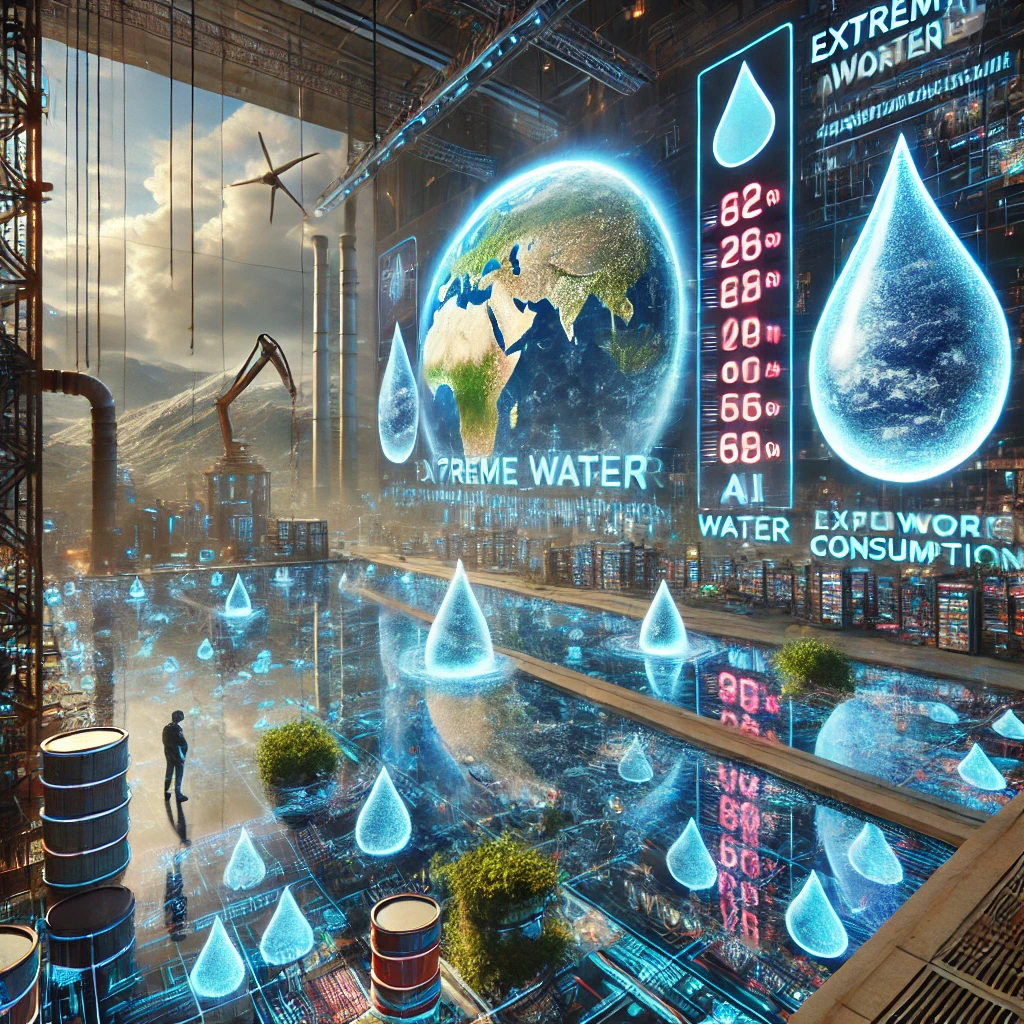
AI and Events
Between innovation and responsibility

Image: ChatGPT. Prompt: Create a striking visual representation of the hidden environmental costs of AI technology, particularly its high water consumption. The overall image should simultaneously convey a critical perspective on the resource consumption, digital future and environmental degradation of AI technology and inspire reflection through strong visual language. Created on 5 February 2025
Image: ChatGPT. Prompt: Create a striking visual representation of the hidden environmental costs of AI technology, especially its high water consumption. The overall image should convey a critical perspective on the resource consumption, digital future and environmental degradation of AI technology simultaneously and inspire thought through strong visual language. Created on 5 February 2025
Artificial intelligence (AI) is changing almost every industry - and the event industry is no exception. Event professionals need to consider not only the advantages of using AI, but also the environmental and social disadvantages. In his guest article, Jürgen May, founder and managing director of CSR agency 2bdifferent, describes how AI can be used responsibly.
From automated planning processes and personalised attendee experiences to intelligent analysis tools, AI offers enormous potential for efficiency and innovation in event management. However, in addition to the opportunities, this development brings with it challenges that are often overlooked: Behind the seemingly immaterial technology lie immense ecological and social impacts. Operating large AI models requires enormous computing power, which leads to high energy consumption.
In addition to environmental aspects, the working conditions in the AI economy must also be viewed critically. Many of the tasks required to train and optimise AI models - such as tagging and categorising data - are carried out by so-called clickworkers in low-wage countries. The event industry faces a double challenge: on the one hand, AI can increase efficiency and enhance the experience for participants, while on the other hand, the industry must be aware of its responsibility towards the environment and society.
Benefits and risks
Practical experience shows that AI is already being used successfully in many areas of the event industry. The most important use cases include automated registration, which enables participants to register easily, or real-time interaction via chatbots, which improve customer service by answering enquiries and providing information. Another example is the optimisation of sustainability through carbon footprinting and demand analyses by evaluating AI data on energy consumption, waste volumes or transport routes and recommending measures for more environmentally friendly events as well as intelligent mobility solutions for participants through personalised suggestions for environmentally friendly travel options. These examples show that AI is not just a vision for tomorrow, but already offers concrete added value for organisers and participants today.
The most important applications for AI in event management
- Automated registration and real-time interaction via chatbots: AI-supported systems enable participants to register quickly and easily. At the same time, intelligent chatbots improve customer service by answering enquiries and providing information in real time.
- Optimising sustainability through carbon footprinting and demand analyses: AI can evaluate data on energy consumption, waste volumes or transport routes and thus recommend specific measures for more environmentally friendly events.
- Intelligent mobility solutions: Participants receive personalised suggestions for environmentally friendly travel options - from carpooling and public transport to e-scooter rentals.
- Sustainable selection of venues and service providers: AI analyses ratings, energy consumption data and sustainability criteria to identify the most environmentally friendly venues and suppliers.
- Security management through crowd monitoring and early warning systems: AI can perform real-time analyses of visitor movements and thus detect bottlenecks or security risks at an early stage.
- Resource planning for catering, logistics and temporary structures: The use of AI allows quantities to be calculated more accurately in order to minimise food waste and material overflow.
- Support for virtual events through AI-driven networking and matchmaking: AI helps to bring the right contacts together by connecting participants based on shared interests or professional backgrounds.
Despite the many advantages, the use of AI in the event industry also harbours risks. One of the biggest challenges is the dependence on digital systems. Technical faults or system failures can paralyse events. If an automated registration or ticketing system fails, for example, this can lead to considerable problems. Without functioning backup solutions, there is a risk that organisers will not be able to react quickly enough in an emergency. Data protection is also a growing challenge. The use of AI requires large amounts of personal data, whether for personalised experiences, security systems or analysis purposes. Organisers must ensure that they comply with the applicable data protection guidelines, especially with regard to the GDPR. Particularly critical is the use of facial recognition software or tracking technologies, which in many cases raise ethical questions. In addition, AI-generated works have no human author and are therefore in the public domain (not protected by copyright). However, there is a risk that AI-generated content may resemble existing copyrighted works. In such cases, copyright infringements could occur, which may lead to legal consequences. The terms of use of the respective AI platform should be read carefully and adhered to, particularly with regard to commercial usage rights.
Big data and the environmental impact
Technological innovations have an often overlooked downside: the significant energy and water consumption associated with the infrastructure for AI models. The energy requirements of large AI systems such as ChatGPT have multiplied dramatically in recent years, resulting in high CO2 emissions. Microsoft alone increased its emissions in connection with AI infrastructures from around 12 to 15 million tonnes of CO2 between 2020 and 2023. In addition, data centres consume enormous amounts of fresh water, which leads to conflicts, especially in water-scarce regions such as Arizona. Even more critically, global AI demand in 2027 is expected to account for 4.2 to 6.6 billion cubic metresof water abstraction - more than the entire annual water abstraction of Denmark or half of the United Kingdom. The more investment is made in AI, the more public awareness is raised of the environmental impact of powering and cooling huge data centres. Companies such as Microsoft, Google and Amazon are investing heavily in AI technology and therefore also in the expansion of energy-intensive data centres. Although these companies have set themselves sustainability targets, the reality remains sobering: the emissions they cause continue to rise, while at the same time only limited measures to reduce resource consumption can be demonstrated. In fact, the regions where the largest growth in data centres is taking place also tend to be areas where a large proportion of the electricity generated comes from fossil fuels. While some technology companies publicly commit to making their operations carbon neutral, the extent to which these promises are actually realised remains questionable. Even if some of the energy required comes from renewable sources, this does not change the enormous amount of water or materials used to build and maintain the infrastructure. In addition, the high energy consumption of AI systems remains an unresolved problem.
"When dealing responsibly with AI, it is important to create transparency and sensitise participants."
Jürgen May, founder and managing director of the CSR agency 2bdifferent
Photo: 2bdifferent
Clickworkers and social responsibility
However, it is not only the environmental impact of resource consumption that is a cause for concern. While AI is often perceived as an autonomous system, it is largely based on human labour. The central aspect is data annotation, a fundamental task in the training of AI systems. Large amounts of data are manually labelled in order to improve algorithms. The Global Wage Report 2024-25 (ILO) provides important insights into working conditions in the digital world of work, particularly for clickworkers in low-wage countries. This work is often carried out by so-called clickworkers - people who work under often precarious conditions in countries such as Kenya or Colombia and train machines with information. Reports show that these workers in Venezuela earn an average of just 90 cents an hour to classify sometimes shocking material for AI models such as ChatGPT. The increasing use of AI is not just a question of efficiency, but of social responsibility. The event industry uses many of these AI applications - be it for image recognition systems, chatbots or automated analyses. However, the conditions under which these technologies are created are rarely scrutinised.
Use AI responsibly
In order to use AI sustainably and responsibly in the event industry, organisers should pay particular attention to energy-efficient technologies, fair working conditions and ethical data processing. A key aspect is the selection of sustainable IT and AI service providers that operate their data centres with renewable energy and disclose their carbon footprints. Preference can be given to providers that use energy-efficient hardware and optimise their power consumption.
Checklist: Using AI sustainably
✅ 1. Choosing sustainable IT and AI service providers ✅ 2. Reduce energy consumption through conscious use of AI ✅ 3. favour privacy-friendly and ethical AI solutions ✅ 4. ensure fair working conditions for clickworkers ✅ 5. Use AI for sustainable event planning ✅ 6. Create transparency and sensitise participants
Data protection and ethics also play a central role. Organisers should ensure that AI applications are GDPR-compliant and that no sensitive biometric data is processed without the participants' consent. Transparency is essential: participants should know where and how AI is used, especially if personal data is involved. In addition to the environmental challenges, the social aspects of AI use must also be taken into account. Many AI applications are based on the work of clickworkers, who often work under precarious conditions. When selecting their providers, event organisers should ensure that fair labour standards and appropriate payment are guaranteed. AI itself can also help to organise more sustainable events. Emissions can be tracked and reduced with the help of AI-supported carbon footprinting. Intelligent mobility solutions can suggest climate-friendly travel options for participants, while AI-supported catering requirement analyses help to avoid food waste.

Photo: 2bdifferent
Jürgen May is the founder and managing director of the consultancy agency 2bdifferent and an expert in sustainability in the event, trade fair and meeting industry. With over two decades of experience in business analysis, sustainable strategies and event management, he advises companies and associations on the development of sustainable, climate-friendly concepts and is committed to the responsible use of AI in the event industry.
My conclusion: AI as an opportunity, but with responsibility
The event industry has the opportunity to utilise AI in a meaningful way - with a conscious focus on sustainability and social responsibility. By focusing on energy-efficient technologies, promoting renewable energies and demanding fair working conditions in the AI industry, event organisers can drive sustainable digitalisation. Ultimately, it's not just a question of technological innovation, but also of business ethics: how do we use AI without exploiting our environment and the people behind the technology? The event industry can play a pioneering role here - with sustainable, responsible and socially just AI strategies.
Jürgen May
New for our international readers:
For the first time, we are offering an English version of our magazine in addition to the German edition. The translation was made with the help of AI and is currently in the test phase. We’d love to hear your feedback on this new service!